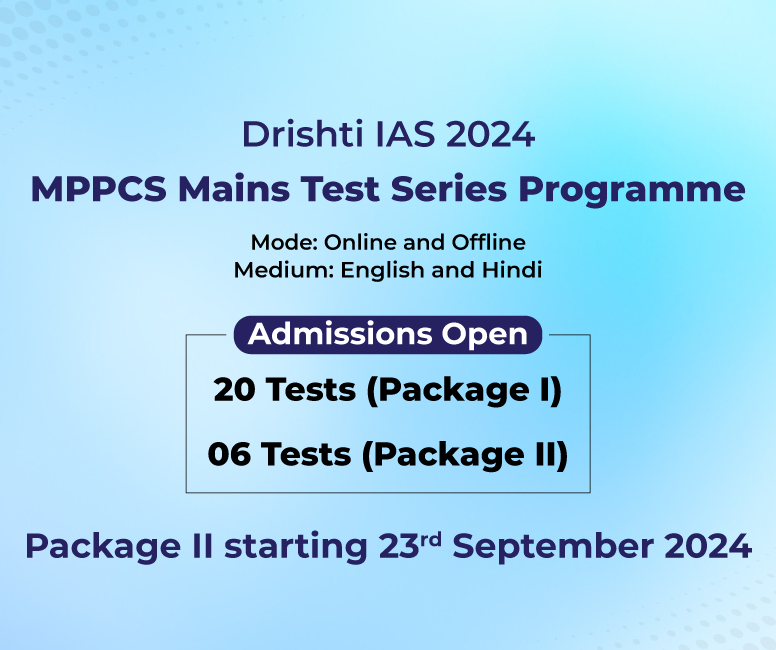Madhya Pradesh Switch to Hindi
Cyber Tehsil
Why in News?
Cyber Tehsil is a digital governance initiative implemented by the Revenue Department, Government of Madhya Pradesh to streamline and modernize land-related administrative processes.
Key Points
- Statewide Expansion: Launched as a pilot on 1st June 2022, now implemented across all 55 districts.
- Purpose: Digitizes land registration and mutation processes, reducing manual intervention and improving transparency.
- Paperless System: Land mutation is fully automated and online, starting automatically after property registration.
- Quick Resolution: Entire process completed within 15 days, ensuring fast and efficient service.
- Automatic Case Generation: Mutation cases are automatically registered via the Inspector General of Registration and Stamps (IGRS) portal, cutting down manual delays.
- Digital Delivery: Updated land records are sent directly via email or WhatsApp.
- Court Case Reduction: Resolves 2 lakh of 14 lakh mutation cases without requiring court appearances, easing the judicial burden.
Inspector General of Registration and Stamps (IGRS)
- IGRS is a key official in charge of managing and overseeing the registration of documents and the stamping process in a state.
- The IGRS supervises the registration of various legal documents such as property deeds, marriage certificates, and other important documents.
- Ensures that the registration process adheres to legal requirements and standards set by the state.
- Manages the collection of stamp duty, which is a tax imposed on certain documents.
- Ensures compliance with stamp duty regulations and takes action against violations.
Madhya Pradesh Switch to Hindi
Diamond Mining in Panna
Why in News?
Recently, Panna district in Madhya Pradesh, a well-known diamond mining hub, announced an auction of rough diamonds.
Key Points
- Panna’s Diamond Industry:
- Panna has been a diamond mining center for centuries.
- The district’s diamond deposits have dwindled due to over-mining, making large discoveries rare.
- Mining serves as an alternative income source for the largely tribal population, with modest daily earnings of Rs. 250-300.
- Legal Issues: Most of the remaining diamond deposits are located in protected forest areas, restricting mining activities. The government is exploring legal solutions to expand operations.
- Mines and Minerals (Development and Regulation) Act, 1957: MMDR Act, 1957 governs mineral exploration and extraction in India. It grants the central government the authority to control mineral resources.
- When one finds a diamond, notify the local authorities, such as the District Collector or relevant mining department, about the diamond.
- Comply with regulations under the Mines and Minerals (Development and Regulation) Act, 1957, and the rules set by the Directorate General of Mines Safety (DGMS).
- When one finds a diamond, notify the local authorities, such as the District Collector or relevant mining department, about the diamond.
- Mineral Concession Rules, 1960: These rules provide the detailed procedures for obtaining mining leases and licenses.
- Diamonds found on government land or within licensed mining areas, rights may belong to the government or the mining leaseholder, subject to the Mineral Concession Rules, 1960.
- Distinction: Despite land ownership, the extraction of minerals requires separate permits from the government, and ownership of minerals may differ from land ownership.
- Mines and Minerals (Development and Regulation) Act, 1957: MMDR Act, 1957 governs mineral exploration and extraction in India. It grants the central government the authority to control mineral resources.
Mines and Minerals (Development and Regulation) (MMDR) Act, 1957
- Regulation of Mineral Resources:
- The Act governs the exploration, extraction, and regulation of mineral resources in India, providing the central government with authority to control and manage these activities.
- Licensing and Lease:
- It establishes the framework for granting licenses and leases for mineral exploration and mining, including procedures for obtaining mining rights.
- Control and Compliance:
- The Act mandates adherence to prescribed standards and regulations for mineral extraction, ensuring environmental protection and proper management of resources.
- Central Government Authority:
- The central government has the power to issue directives and enforce regulations related to the development and regulation of mineral resources, including the collection of mineral royalties and fees.
Switch to Hindi










.jpg)
.jpg)








.png)
.png)









